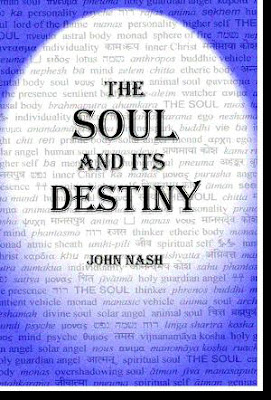 The Quest for the Soul
The Quest for the Soul
and The Soul and Its Destiny.
He is about ready to go to print with a history of Christianity. I will let you know when it is released. John is also the editor of an on-line magazine, The Esoteric Quarterly. Here is the description from its webpage:

The Esoteric Quarterly is an online journal published by the School for Esoteric Studies. It provides a medium for the dissemination of high-quality articles on esoteric philosophy and its applications to individual and group service and to the expansion of human consciousness.
If you are an author with this type of interest, you can submit an article. Here are the guidelines:
The Esoteric Quarterly solicits high-quality articles on esoteric philosophy and its applications to individual or group service and to the expansion of human consciousness. Topics may relate to either the eastern or western esoteric tradition. Examples of the eastern tradition are the works of Alice Bailey, Helena Roerich, Sri Aurobindo, the Dalai Lama, and Geoffrey Hodson. Representative of the western tradition are the works of Rosicrucian and Qabalistic writers. Topics that integrate different traditions are particularly encouraged.
I was notified of the latest issue today which you can see here. You can read a fine article by John Nash, Esoteric Healing in the Orthodox, Roman, and Anglican Churches.
I was thinking about the esoteric traditions as I was reading the latest posts by April DeConick on Gnosticism. She writes:
There were ancient Gnostics - folks that self-defined as Gnostics (seekers after the direct experience of God v. intellectual understanding of him). These people formed lodges or conventicles or study circles where they studied, prayed, and held initiation rituals. They were interested in esoterica - the hidden meaning of the scriptures, and learning the mysteries of the Kingdom, which included experiential journeys into the upper Aeons. These people sometimes continued to attend apostolic churches or synagogues. Sometimes they choose not to, and defined themselves apart from the churches and synagogues. (Read More)I am pleased that Prof. DeConick is helping people understand those whom the majority (when they gained power) lumped together as one group as heretics. The history of early Christian origins can help us understand the diversity of our heritage. This great esoteric tradition continues in many valuable forms today within the church. I find my esoteric members incredibly bright, caring, and important contributors to our communities. The orthodox of old were less charitable. I hope we have learned our lessons.
I like April DeConick's historical approach. (Not surprising of a professor, I suppose) This mixed, esoteric collection of people and ideas comes out real quick when reading selections from Meyer's Gnostic Bible The first book I read on Gnosticism was Elain Pagels Beyond Belief Although her book is very interesting, not so dry, but still historical, it didn't give me the sense of the very broad separate groups of thought in the so called "Gnostic" groups of early Christianity, which clearly seems more historically accurate.
ReplyDeleteAs a compulsive realist, mystical and esoteric philosophies never really set in with me. I guess thats why I don't care for typical conservative Christianity. But you can still have a realist view of mystical and esoteric philosophies like Christianity. Just take the Dali Lama's writings. He has an amazing skill to take his esoteric religion and make it applicable to every human being.
Hi Michael!
ReplyDeleteI appreciate your comments here and on other posts. I just started glancing through your web page, My4acres, very good. Sustainable living is what we need to move toward.
Also, it would be fun for us to do something with your congregation...